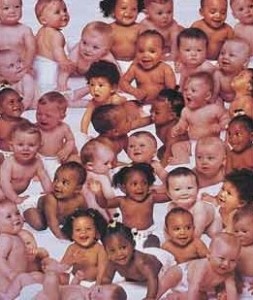I don’t often get a chance to do cute but here we go,
I came across a Jan. 24, 2012 news item on Medical Xpress about research showing that babies intuitively understand physics (it makes sense when you see the reasoning),
In a review of related scientific literature from the past 30 years, vanMarle [Kristi vanMarle, an assistant professor in the Department of Psychological Sciences at the University of Missouri] and Susan Hespos of Northwestern University found that the evidence for intuitive physics occurs in infants as young as two months – the earliest age at which testing can occur. At that age, infants show an understanding that unsupported objects will fall and that hidden objects do not cease to exist. Scientific testing also has shown that by five months, infants have an expectation that non-cohesive substances like sand or water are not solid. In a previous publication, vanMarle found that children as young as 10 months consistently choose larger amounts when presented with two different amounts of food substance.
For any parents planning to discuss physics with their babies or start them on a physics enhancement programme, vanMarle has a few words of advice,
“Despite the intuitive physics knowledge, a parent probably cannot do much to ‘get their child ahead’ at the infant stage, including exposing him or her to videos marketed to improve math or language skills,” vanMarle said. “Natural interaction with the child, such as talking to him/her, playing peek-a-boo, and allowing him/her to handle safe objects, is the best method for child development. Natural interaction with the parent and objects in the world gives the child all the input that evolution has prepared the child to seek, accept and use to develop intuitive physics.”
For those who want examine the research first hand,
“Physics for infants: characterizing the origins of knowledge about objects, substances and number,” is published in the January issue of WIREs Cognitive Science.
I suppose you could say we are natural physicists.
